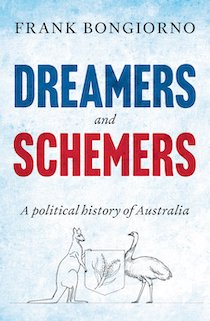Public ideas
Stan Grant on black swans

Surely an outlier
A pandemic, Russia’s invasion of Ukraine, and a brewing revolution in Iran, are all events that fall into the category of “black swan” events, so-called by statistician Nicholas Taleb because they fall outside our range of expectations, even though, with the clarity of hindsight, they seem to be so predictable as we reflect on the events and developments that lead to these disruptions.
“But even if we should know, we often don't want to know. We certainly don't prepare”, writes Stan Grant: Should we have predicted Black Swan events like COVID and the war in Ukraine? Where is the next crisis coming from?.
Financial crises and wars are more commonplace than we would like to believe. Grant reminds us of worsening relations between China and the USA, and the related possibility over a war over Taiwan, into which Australia would most likely be drawn. That is a black swan event that puts a problem like a little inflation into context.
Two essays on democracy
The first essay is a questioning of the often-held idea that there is a democratic “west”, as if political ideas and institutions are geographically-defined, and that they pass from neighbour-to-neighbour.
Three academics from the University of Auckland, and one from the RAND Corporation, have looked at the way waves of democratization over the last 220 years have actually spread, in a Conversation essay: Democracy spreads in waves – but shared cultural history might matter more than geography. They have found that “countries that share linguistic or religious ancestry tend to have more similar democracy scores”. These factors do not explain the spread of democratic ideas in themselves, but they are indicators of deeper cultural connections that aid the spread of ideas.
The second essay is an extract from Frank Bongiorno’s book, Dreamers and Schemers: a political history of Australia.

The extract, published in The Conversation, remarks on our generally laid-back approach to politics, while reminding the reader that the political culture we have come to take for granted, came about through the efforts of organized political movements.
Big change of the kind that occurred in Australia in the 1850s, 1890s, 1940s and 1980s would have been impossible without the idealists and thinkers: that is, without political leaders, activists, intellectuals and movements who refused to be merely “practical”.
Bongiorno sees Australians as enjoying what could be described as a transactional relationship with government – a relationship based more on utilitarianism rather than grand ideas. That relationship was on display during the pandemic, when, contrary to the myth of our larrikin anti-authority attitudes, we accepted governments’ public health restrictions and went off to get vaccinated.
He considers this year’s election of the Labor government as possibly another political revolution. That assessment is based on the success of independents and the ineffectiveness of the News Corp propaganda machine that urged us to stick with the Coalition. The extract ends with the tantalizing statement:
While the challenges faced by the new government were formidable, for a moment it seemed possible that the nation’s imaginative energies might not yet be completely exhausted.
Thursday night’s Late Night Live is entirely devoted to a discussion between Phillip Adams and Paul Bongiorno about Australia’s political history.
Place matters
Neoliberalism embodied a grand vision, of a world with a prosperous middle class, and from economic liberalism would flow political liberalism. “The idea was that other countries, delighted by the fruits of American-style capitalism, would be moved to become ‘free’ like the United States.”
That’s a quote from Rana Foroohar After Neoliberalism, all economics is local, in Foreign Affairs.
The neoliberal order didn’t work out that way, Foroohar reminds us, and she explains why. In most countries inequality has risen, largely because financial liberalism became a much more pervasive force than liberalism of trade and real investment. That’s because money moves faster than real resources and people, who are at least partially rooted to place. Inequality has risen not only between classes, but also geographically within countries. Drawing on the ideas of the world’s leading economists she writes:
… there is now a consensus among scholars that geographically specific factors such as the quality of public health, education, and drinking water have important economic implications. That might seem intuitive or even obvious to most people, but it has only recently gained broad acceptance among mainstream economists.
She goes on to explain in more detail how the neoliberal experiment has failed, and its consequences in fuelling disenchantment and political polarization in the USA. The order that emerges should be more localized, with less reliance on outsourcing activities to other countries, with shorter supply lines, and with more local resilience. Government policies should encourage local enterprise, but not through traditional import-substitution measures (such as tariffs) but through encouragement of local enterprise.
Her ideas align with sound and tested economic theory. A condition for enduring regional development is that policies aimed at creating or protecting “jobs” generally fail over the medium to long term. When governments pursue policies to encourage high-value activities, however, even if they are not labour-intensive, employment will follow, but not necessarily in those industries.
Neoliberalism – an obituary
On his Policy Post Martyn Goddard describes the long, slow death of neoliberalism, and surveys the wreckage it has left behind. In English-speaking countries, including Australia, neoliberal policies reversed 80 years of progress towards reducing income disparities. In the 40 years since 1980 our income inequality has now climbed back almost to where it was at the start of the twentieth century, and that extended period of income inequality has entrenched wealth inequality.
Privatization, one of the planks of neoliberalism, has delivered nothing but higher prices, massive leaps in salaries for executives in once well-run public utilities, and a transfer of wealth to the corporate sector. Goddard focuses on electricity, while mentioning water, sewerage, railroads, trams, prisons, insurance and ports. (As a Tasmanian he forgot to mention toll roads.)
Another plank of privatization, “small government”, has left us with an emaciated public sector as governments cut spending and taxes. He confirms what many others have noted, that our taxes are way lower than in other “developed” countries.